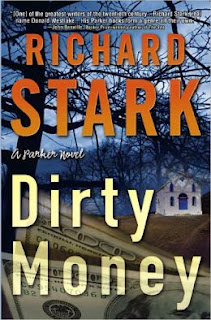This is not the end of Parker's story.
Oh, sure, Dirty Money was the last book Richard Stark published -- it could hardly be otherwise, since his alter ego, Donald Westlake, died suddenly soon after this book came out. But Parker ends this novel the way he ends every one of his books: having just finished dealing with one tough situation, and looking forward to the next one.
There always will be a next one, even if Westlake/Stark isn't able to tell us about them. Somewhere out there, there's an unguarded fur warehouse, or a shipment of worn $20 bills heading to a furnace, or a pile of bearer bonds -- something very valuable, not guarded as well as it should be, and ripe for the picking. And Parker is casing that job, as he will be casing the next one, and the one after that.
There will be problems along the way: unreliable compatriots, and foolhardy guards, and bad luck, and fingers who don't know to leave the details to professionals. There will be shots fired, and sudden silent violence in dark rooms. There will be money lost, money discovered by the police, money left behind. There will be cars stolen, tires shot out, plates swapped. There will be fake IDs, more difficult and complicated each decade. There will be long trips around the country, to meet or hit or relax. There will be men who are worth working with, and men who aren't. There will be men who survive, and men who don't. There will be plans that can't fail, and plans that barely have a chance to succeed. And Parker will be stalking calmly through all of those problems, focused, as he always is, on getting the job done with the minimum of fuss and getting out the other side with his rightful share of the money.
And, of course, both "minimum of fuss" and "his rightful share" are very subject to local variation.
So Dirty Money finished up the trilogy of novels that were the last thing "Richard Stark" wrote: beginning about a day after the end of Ask the Parrot and mostly taking place over the next week. Parker has gotten away from the armored-car heist of Nobody Runs Forever, after the use of Carl-Gustaf anti-tank weapons in that job triggered a massive manhunt and omnipresent police roadblocks in western Massachusetts. He even did a smaller job along the way, during Ask the Parrot, and made it back home to the northwestern corner of New Jersey with a duffel bag full of money and a stolen car. The former gets stashed in bits and pieces around the surrounding houses, in places only Parker knows about. The latter get dropped deep into a lake.
But all of Parker's ID is burned; he can't even drive a car too far from home. And one of his partners from the armored-car job, Dalesia, was captured by the police and then escaped -- leaving Parker unsure whether he'd told the cops where the money was, or about Parker and his other partner, McWhitney. And Parker and McWhitney would sure like to find a way to get that money out -- even though the roadblocks are still up, less than two weeks after the heist. And the surviving bounty hunter from Nobody Runs Forever is still lurking around, causing trouble until her bounty from a dead man comes in. And the FBI make a quick call on Parker's girl Claire's house, following up on a call Dalesia made there before the heist.
So Parker should go somewhere else -- somewhere safe -- and get a new name, and wait for the heat to die down. Instead he goes, with Claire, right into the center of that police search, trusting in the camouflage of a "leaf peeping" couple to let him check on the money. And that was probably a bad idea, but Parker's bad ideas tend to work out for him in the end -- though not before a lot of commotion and tension and violence and danger.
Dirty Money could have led to another era of Parker, if Westlake had survived. He gets his new ID over the course of the book, but works -- deliberately -- with a minor mob operation to get it. Would Parker's next story involve that handle he let the mob get on him? Would Parker agree to some organized-crime job to square that debt? Or would that just lead to more trouble and complications?
We can never know what happens next. But we do have the twenty-four Parker novels that Stark did write. And those still are the strongest sustained accomplishment in American crime fiction of the 20th century: a forty-six year span of excellent novels about a great character. And that is definitely a lot.
(I also read and reviewed Dirty Money here when it was originally published in 2008, just a couple of months before Donald Westlake's untimely death on New Year's Eve.)
Postscript: This is the last Stark novel, but Starktober isn't quite over yet. Come back tomorrow for a bit of lagniappe, and then an afterword/wrap-up on Friday.
Starktober Introduction and Index

No comments:
Post a Comment